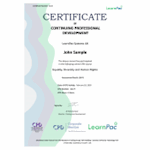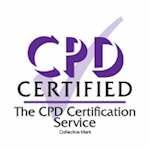Equality, Diversity and Human Rights - Level 1 - Online Course - CPD Accredited
CPDUK Accredited | Instant Course Access | Includes Assessment & Certificate | Instant Certificate Download
LearnPac Systems
Summary
- Exam(s) / assessment(s) is included in price
- Tutor is available to students
Add to basket or enquire
Overview
Equality, Diversity and Human Rights - Level 1 - Online Course - CPD Accredited.
Welcome to our online Equality, Diversity and Human Rights training course for front-line healthcare and social care providers. All our online training courses, programmes and qualifications are accredited by the CPD Certification Service (CPDUK).
The health and social care sectors have a responsibility to ensure delivery of services and workforce management which fully demonstrate and reflect the principles of equality, diversity and human rights.
It is through the active and adequate understanding of Equality, Diversity and Human Rights that the healthcare and social care sectors will be able to recruit and retain a workforce that is more reflective of and sensitive to the population it seeks to serve.
Certificate duration: 2 years
Entry requirements: No entry restrictions
Recommended prerequisites: N/A
Assessment type: End of course assessment
Assessment pass mark – 80% needed to pass and gain a CPD certificate
Cost(s) of assessment and certification – All costs included in the course price
Awarding/Accrediting body – CPD Certification Service (CPDUK)
Equality, Diversity and Human Rights - Level 1 - Online Course - CPD Accredited.
CPD
Course media
Description
Course aims
By the end of this online Equality, Diversity and Human Rights training course, learners will:
- Understand their workplace responsibilities as stated by the Equality Act 2010,
- Know the protected characteristics that are covered by the law,
- Understand what is meant by discrimination and be able to recognise the different types,
- Understand what is deemed as prohibited conduct within the Equality Act, and
- Be aware of the importance of equality and diversity training so that the workplace can become more tolerant and understanding.
Learning outcomes
On completion of this online Equality, Diversity and Human Rights training course, the learner will:
- Understand the terms of Equality and Diversity and Human Rights and how they are applied within the context of the health sector,
- Understand how a proactive, inclusive approach to equality and diversity and human rights can be promoted,
- Understand the purpose and benefits of monitoring equalities and health inequalities,
- Understand the benefits that a practical approach to equality and diversity and human rights can have on society, organisations and individuals,
- Understand how legislation, organisational policies and processes can empower individuals to act appropriately and understand people’s rights,
- Know how to treat everyone with dignity, courtesy and respect and value people as individuals, and
- Know what to do if there are concerns about equality and diversity practices, including how to use any local whistleblowing policy procedures and other related policies such as Bullying at Work and Dignity at Work.
For Wales only:
- Understand Public Sector Equality Duties.
The learning outcomes listed above reflect a minimum standard which should be incorporated into equality, diversity and human rights education and training for all staff groups.
What is equality?
Social equality is a state of affairs in which all people within a specific society or isolated group have the same status in certain respects, including civil rights, freedom of speech, property rights and equal access to certain social goods and services. However, it also includes concepts of health equality, economic equality and other social securities. It also includes equal opportunities and obligations, and so involves the whole of society.
What is diversity?
Diversity is any dimension that can be used to differentiate groups and people from one another. In a nutshell, it’s about empowering people by respecting and appreciating what makes them different, in terms of age, gender, ethnicity, religion, disability, sexual orientation, education, and national origin.
Diversity allows for the exploration of these differences in a safe, positive, and nurturing environment. It means understanding one another by surpassing simple tolerance to ensure people genuinely value their differences. This allows us both to embrace and also to celebrate the rich dimensions of diversity contained within each individual and place positive value of diversity in the community and the workforce.
What is inclusion?
Inclusion is an organisational effort and practices in which different groups or individuals having different backgrounds are culturally and socially accepted and welcomed, and equally treated. These differences could be self-evident, such as national origin, age, race and ethnicity, religion/belief, gender, marital status and socioeconomic status or they could be more inherent, such as educational background, training, sector experience, organisational tenure, even personality, such as introverts and extroverts.
What are human rights?
Human rights are moral principles or norms that describe specific standards of human behaviour and are regularly protected as legal rights in municipal and international law. They are commonly understood as inalienable fundamental rights “to which a person is inherently entitled simply because she or he is a human being”, and which are “inherent in all human beings” regardless of their nation, location, language, religion, ethnic origin or any other status.
Why is this online Equality, Diversity and Human Rights training course important?
Equality is about creating a fairer society where everyone has the opportunity to fulfil their potential. Diversity is about recognising and valuing difference in its broadest sense. Human rights are the legal rights and freedoms that individuals can expect to enjoy, can exercise and are based on core principles such as dignity, fairness, equality, respect and autonomy. Equality, Diversity and Human Rights are entirely relevant to day-to-day life and provide the framework which protects the freedom for individuals to control his/her own life, prevent discrimination and set expectations for enabling fair and equal services to and from public authorities.
The health and social care sectors have a responsibility to ensure delivery of services and workforce management which fully demonstrate and reflect the principles of equality, diversity and human rights.
It is through the active and adequate understanding of Equality, Diversity and Human Rights that the healthcare and social care sectors will be able to recruit and retain a workforce that is more reflective of and sensitive to the population it seeks to serve.
What is covered in this course?
This online Equality, Diversity and Human Rights training course covers the following:
- An introduction to equality, diversity and human rights
- Why awareness of equality, diversity and human rights is essential in the health and social care sectors
- The meaning of equality, diversity and human rights (and other vital terms)
- An awareness of the Equality Act 2010
- An understanding of the general duties of the Equality Act 2010
- Protected characteristics of the Equality Act 2010
- Definitions and practical applications of fairness and equality
- How to judge what is ‘reasonable’ in terms of the Equality Act
- How can health and social care organisations promote an inclusive approach
- The Human Rights Act 1998
- An understanding of human rights under the Human Rights Act
- An understanding of absolute and non-absolute rights
- A human rights-based approach to delivering healthcare services
- An awareness of the F.R.E.D.A. core principles when providing services
- What the law says about discrimination
- The primary forms of discrimination (including institutional discrimination)
- An understanding of workplace bullying and harassment
- The basis of discrimination and the ‘ladder of prejudice.’
- How to challenge prejudice and discrimination within the workplace
- Reporting Discrimination and harassment
- Benefits of a practical approach to tackling discrimination
- Individual responsibilities with regards to equality, diversity and human rights
- Organisational duties with regards to equality, diversity and human rights.
Equality, Diversity and Human Rights - Level 1 - Online Course - CPD Accredited.
Who is this course for?
This Equality, Diversity and Human Rights e-learning course should be completed by those who work in health and social care services including:
- NHS medical, nursing, AHP and care staff,
- Locum doctors and nurses,
- Locum allied health professionals (AHPs),
- Agency nurses,
- Agency workers,
- Healthcare assistants,
- Support workers,
- Care assistants, and
- Community services.
Equality, Diversity and Human Rights - Level 1 - Online Course - CPD Accredited.
Requirements
Learn anywhere, anytime on any device.
You will need access to a desktop computer, laptop, tablet or smartphone device to complete these online courses. You can start, pause/stop and return to where you left off.
Our courses utilise responsive design features, making them available on any device of your choice.
Equality, Diversity and Human Rights - Level 1 - Online Course - CPD Accredited.
Career path
Our online courses and programmes range from introductory modules at Level 1 (awareness/beginner) to advanced and expert modules up to Level 6.
Our e-learning modules count towards CPD hours for professionals in various sectors as well as meeting mandatory and statutory requirements (where relevant).
Equality, Diversity and Human Rights - Level 1 - Online Course - CPD Accredited.
Questions and answers
Currently there are no Q&As for this course. Be the first to ask a question.
Reviews
Currently there are no reviews for this course. Be the first to leave a review.
Legal information
This course is advertised on reed.co.uk by the Course Provider, whose terms and conditions apply. Purchases are made directly from the Course Provider, and as such, content and materials are supplied by the Course Provider directly. Reed is acting as agent and not reseller in relation to this course. Reed's only responsibility is to facilitate your payment for the course. It is your responsibility to review and agree to the Course Provider's terms and conditions and satisfy yourself as to the suitability of the course you intend to purchase. Reed will not have any responsibility for the content of the course and/or associated materials.





